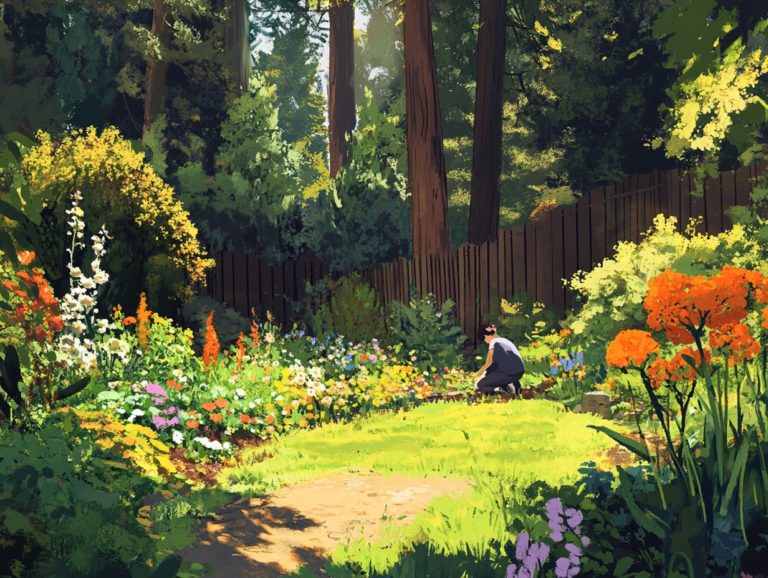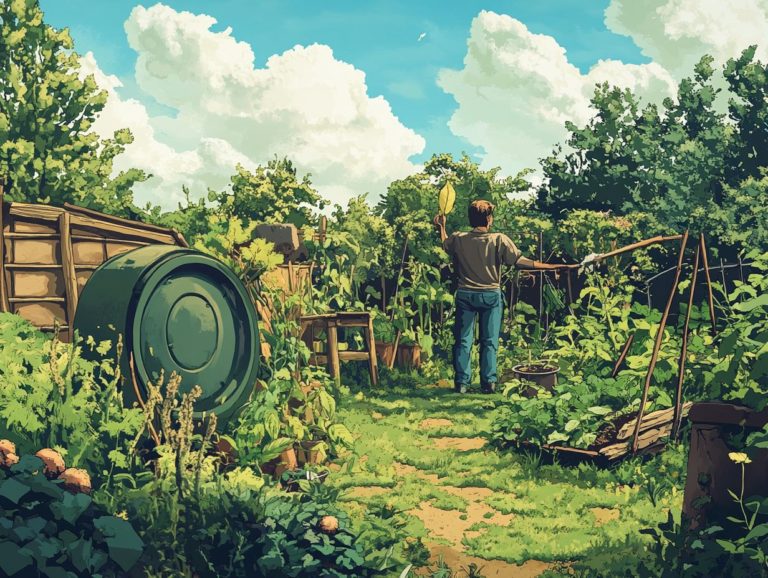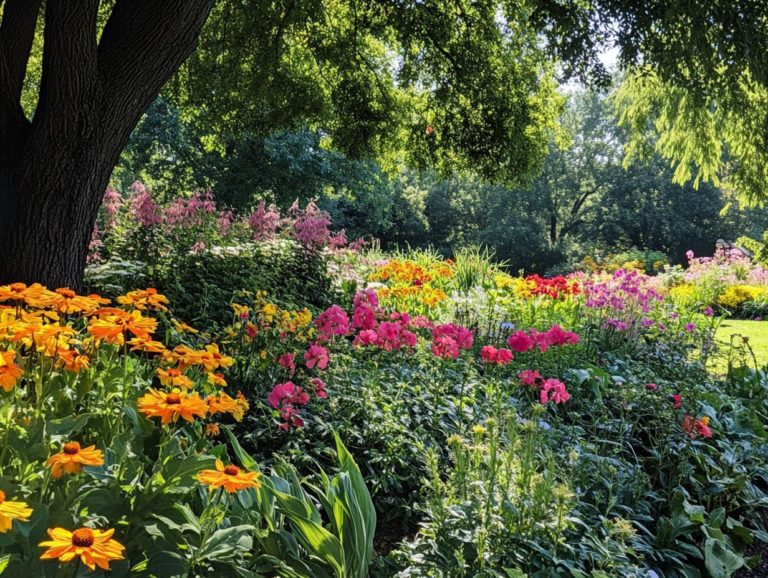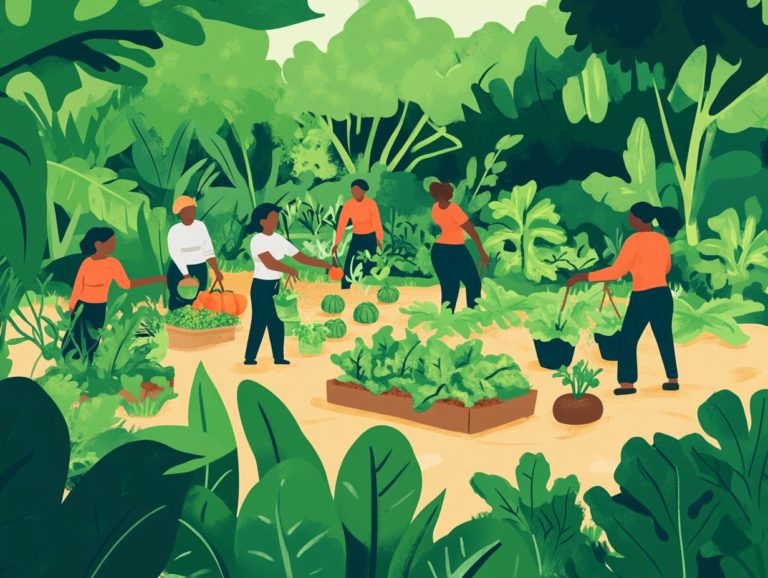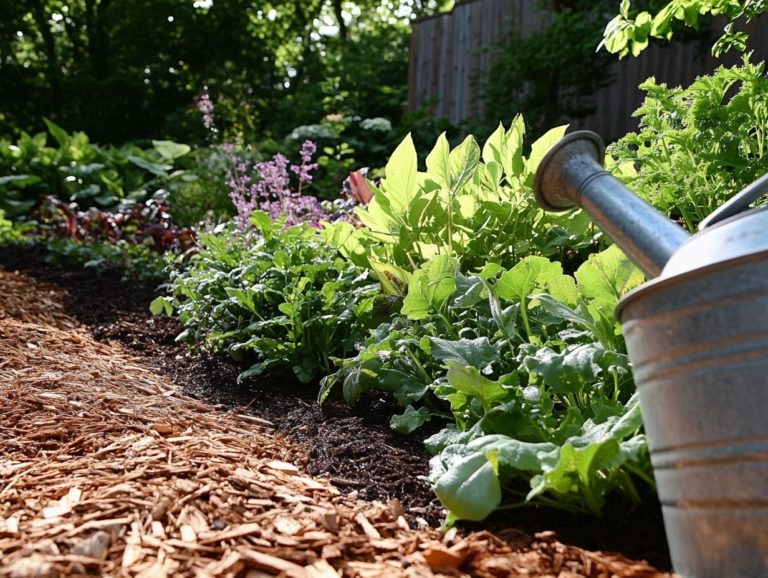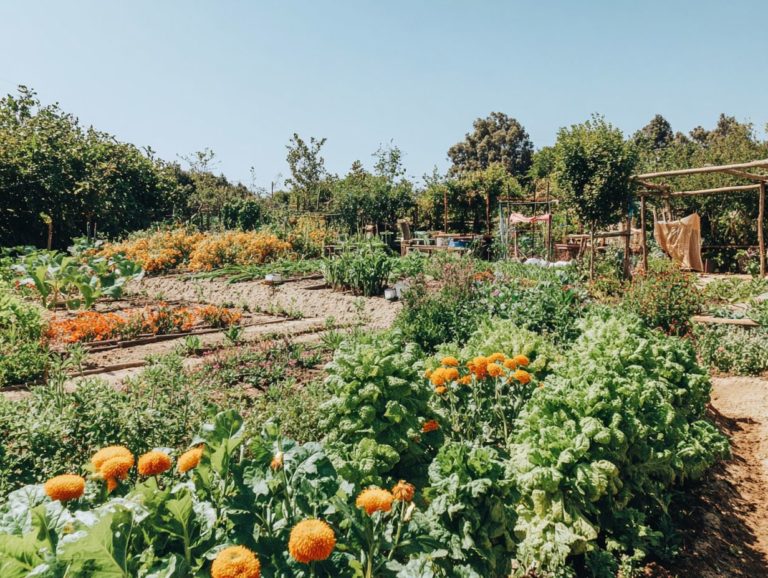How to Cultivate a Healthy Garden Ecosystem?
Creating a healthy garden ecosystem is vital for nurturing thriving plants and cultivating a vibrant environment.
In this article, you will explore the numerous benefits of fostering a balanced ecosystem. From choosing the right plants to attracting beneficial insects and wildlife, there s much to discover!
Discover practical strategies for maintaining your garden, including efficient watering techniques, thoughtful fertilization, and natural pest control methods. You ll also find valuable tips on harvesting and preserving your bounty. Embrace the beauty of a flourishing garden and unlock its full potential!
Contents
- Key Takeaways:
- The Importance of a Healthy Garden Ecosystem
- Creating a Balanced Ecosystem
- Practices for Maintaining a Healthy Garden Ecosystem
- Harvesting and Preserving from a Healthy Garden Ecosystem
- Frequently Asked Questions
- What is a garden ecosystem and why is it important to cultivate a healthy one?
- How can I promote biodiversity in my garden ecosystem?
- What are some natural ways to control pests in my garden ecosystem?
- How can I improve the soil health in my garden ecosystem?
- What are some sustainable practices I can incorporate into my garden ecosystem?
- How can I maintain a balanced ecosystem in my garden?
Key Takeaways:
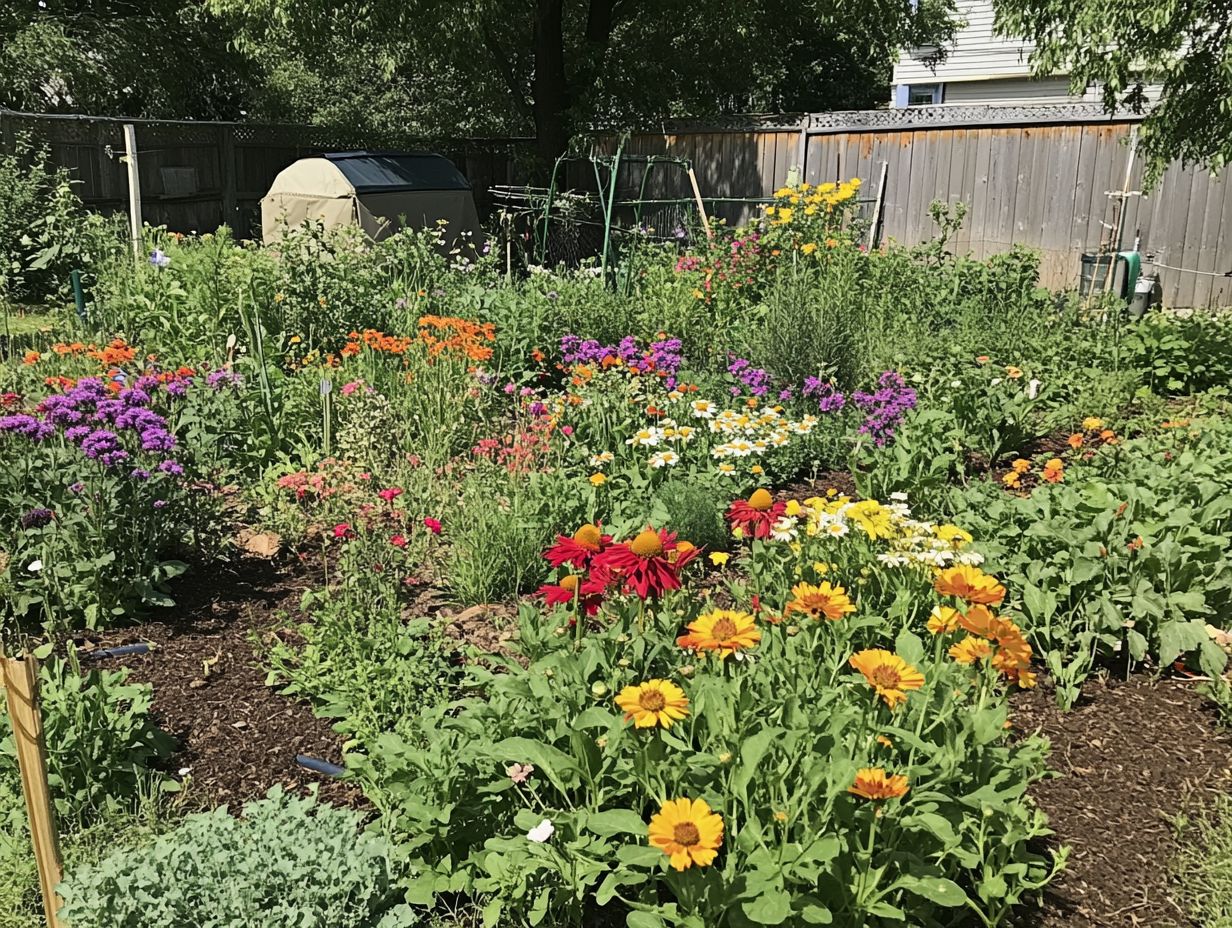
- A healthy garden ecosystem provides benefits for both plants and the environment, such as increased pollination and soil health.
- Choosing the right plants and introducing beneficial insects and animals can create a balanced ecosystem and promote natural pest control.
- Proper watering, fertilization, mulching, composting, and controlling pests and diseases naturally are essential practices for maintaining a healthy garden ecosystem.
The Importance of a Healthy Garden Ecosystem
A flourishing garden ecosystem is essential for promoting biodiversity and supporting wildlife conservation. It ultimately paves the way for a sustainable gardening experience.
Embracing ecosystem gardening principles elevates the beauty of your outdoor space and cultivates a thriving environment that benefits all living organisms within it. Incorporating native plants and sustainable practices creates a vibrant habitat that supports pollinators and enhances soil health. This ensures a balanced ecosystem that flourishes for generations to come.
Benefits for Plants and the Environment
The advantages of cultivating a healthy garden ecosystem go well beyond visual appeal; they enhance biodiversity, conserve wildlife, and for more information, you can learn how to monitor and improve your garden’s health, which ultimately improves the overall health of the environment.
This vibrant setting becomes a sanctuary for various species, enriching your local community while promoting ecological balance. Incorporating native plants creates essential habitats and food sources tailored specifically for local wildlife. When you adopt organic gardening methods, you nurture your plants and contribute to the vitality of pollinators like bees and butterflies. This ensures healthier plant reproduction and boosts crop yields.
These practices lead to enhanced soil health and minimize reliance on chemical fertilizers. They support crucial ecosystem services, such as water filtration and carbon sequestration, which is capturing and storing carbon dioxide. In doing so, you create a more sustainable and resilient landscape for the future.
Creating a Balanced Ecosystem
Creating a balanced garden ecosystem calls for strategic planning and a keen understanding of how ecosystems work. It s all about integrating sustainable practices with effective gardening techniques.
By prioritizing native flora, you foster a harmonious relationship between your plants, soil microorganisms, and local wildlife. This approach promotes ecological design and ensures diverse habitats that support beneficial insects while enhancing the overall health of your ecosystem.
Choosing the Right Plants
Choosing the right plants is crucial for cultivating a thriving garden ecosystem. Selecting native plants enhances plant diversity and supports the health of your environment.
Incorporating native species is a game-changer! You not only create a visually stunning landscape but also establish a haven for local wildlife, including essential pollinators like bees and butterflies. These plants have evolved to flourish in their natural settings, requiring less water and fewer chemical inputs, significantly benefiting soil health. They also naturally deter pests that could threaten non-native varieties, minimizing your reliance on synthetic pesticides.
This approach beautifully aligns with the principles of organic gardening. It promotes biodiversity that bolsters the resilience of your garden. In doing so, you ll foster a vibrant ecosystem that enriches both your plants and the surrounding environment.
Introducing Beneficial Insects and Animals
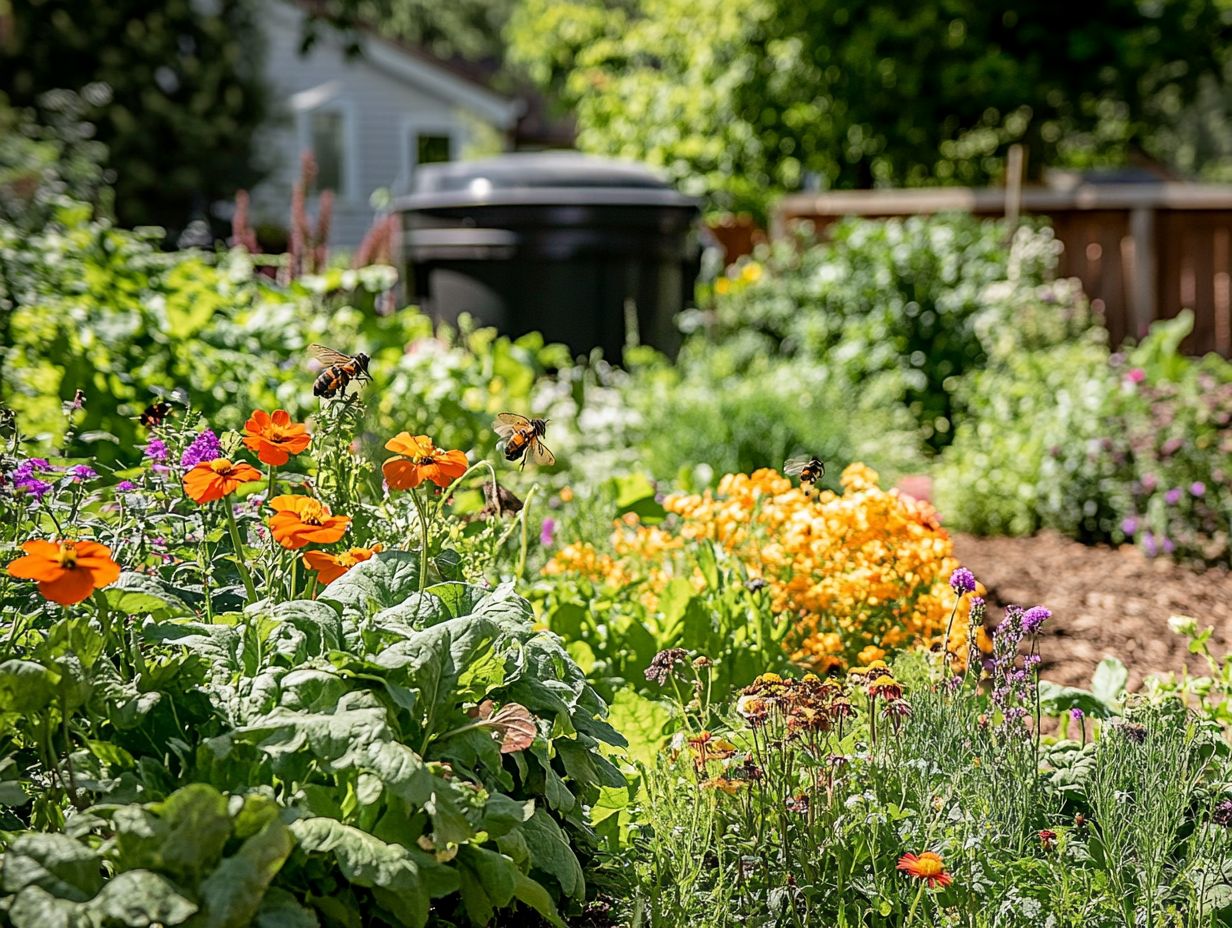
Introducing beneficial insects and animals into your garden can significantly elevate its ecological balance while promoting natural pest control. Ultimately, this reduces your reliance on chemical pesticides.
Bees, ladybugs, and lacewings are your garden’s best friends. They are essential participants in pollination and predation, ensuring your plants thrive while keeping harmful pests at bay.
To attract these vital organisms, consider incorporating a variety of native flowering plants that bloom throughout the seasons. This provides a continuous food source for pollinators.
Creating habitats, such as brush piles, insect hotels, or small water features, fosters an inviting environment for these creatures. By embracing organic gardening practices, you enhance ecosystem health and encourage biodiversity. This leads to a sustainable garden that flourishes naturally with the support of its insect inhabitants.
Practices for Maintaining a Healthy Garden Ecosystem
Practicing effective garden maintenance is essential for nurturing a vibrant garden ecosystem. This involves using simple gardening methods, such as composting and utilizing organic methods for natural pest control.
Act now to ensure your garden thrives for years to come! By adopting these practices, you ensure the long-term health and vitality of your garden.
Proper Watering and Fertilization
Proper watering and fertilization are essential for maintaining a healthy garden ecosystem. They ensure that your soil remains vibrant and your water usage is efficient.
By adopting effective watering techniques like drip irrigation or rainwater harvesting, you minimize water waste. This method delivers moisture directly to the roots of your plants, where it s needed most, encouraging robust growth.
Incorporating organic fertilizers enriches your soil with vital nutrients. This fosters beneficial microbial activity that enhances both soil structure and fertility.
Together, these practices create an ecosystem that supports biodiversity, increases resilience against pests, and plays an integral role in sustainable gardening.
Imagine the joy of seeing your plants flourish and your garden thrive it’s truly fulfilling!
Mulching and Composting
Mulching and composting are fundamental practices you should embrace to elevate soil health and foster a thriving garden ecosystem. These techniques benefit the soil microorganisms and bolster overall plant growth.
By incorporating these methods, you’re creating a vibrant environment where beneficial bacteria, fungi, and earthworms flourish. These organisms play a crucial role in nutrient cycling and enhancing soil structure.
Composting is your secret weapon, breaking down organic materials like kitchen scraps and yard waste to enrich your soil with essential nutrients.
Organic mulch whether it s straw, wood chips, or shredded leaves serves as a protective barrier against soil erosion, conserves moisture, and curbs weed growth.
Together, these practices not only boost biodiversity but also cultivate a resilient ecosystem, enabling your plants to thrive naturally while contributing to a sustainable environment.
Controlling Pests and Diseases Naturally
Controlling pests and diseases naturally is essential for maintaining a vibrant garden ecosystem. This involves employing effective gardening techniques that promote beneficial insects while deterring invasive species.
By adopting this approach, you reduce your reliance on chemical pesticides. You also cultivate a balanced habitat for diverse life forms within your garden.
Encouraging creatures like ladybugs, lacewings, and parasitic wasps allows you to establish a natural defense system targeting harmful pests, significantly enhancing your pest control efforts.
You can incorporate organic solutions such as neem oil, garlic spray, and diatomaceous earth to tackle unwanted invaders without harming the environment. Implementing crop rotation, which means changing the type of plants you grow in a particular area each year, and companion planting, which involves growing different plants close together for mutual benefits, helps disrupt pest life cycles.
This ultimately creates a more resilient garden that thrives sustainably.
Harvesting and Preserving from a Healthy Garden Ecosystem
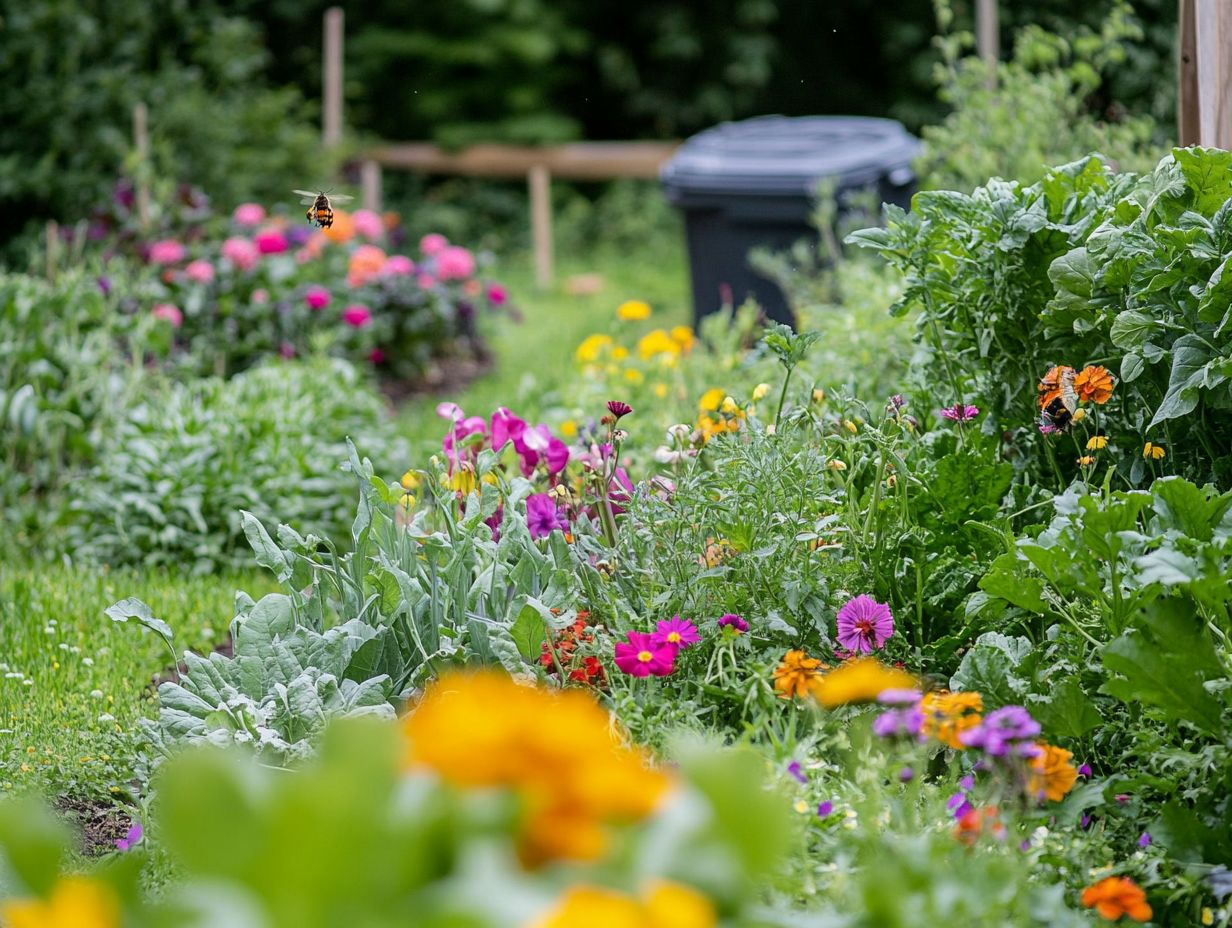
Harvesting and preserving produce from your thriving garden ecosystem isn’t just a gratifying experience; it’s vital for supporting sustainability and making the most of your garden. Embracing this practice enables you to cultivate a garden that flourishes while utilizing every inch you have.
Tips for Successful Harvesting
Successful harvesting begins with your choice of plants. Use organic methods to ensure you get the best quality produce.
Timing plays a crucial role, as each crop has its best time to harvest, influenced by the seasons and weather conditions. By using the right tools, like sharp and clean shears or harvest knives, you minimize damage to the plants and promote ongoing growth. Employing techniques such as staggered planting can extend your harvest period, ensuring a steady supply of fresh vegetables.
Fostering biodiversity in your garden leads to more sustainable pest management. This reduces the need for harsh chemicals. Focus on soil health by composting and rotating crops. These practices enhance the quality of your harvest and secure the long-term viability of your gardening ecosystem.
Methods for Preserving Produce
Preserving your produce allows you to savor the fruits of your labor throughout the year while enhancing a healthy ecosystem and embracing sustainable gardening practices.
By employing various techniques like canning, freezing, and drying, you can effectively extend the shelf life of your organic harvest. Canning involves sealing fruits and vegetables in jars, locking in both flavor and nutrients an excellent choice for storing your excess bounty. Freezing preserves your produce at its peak freshness, making it easy to maintain a well-stocked supply of seasonal ingredients. Drying removes moisture from food, resulting in lightweight snacks bursting with flavor.
Adopting these organic methods not only reduces waste but also ensures that the energy and effort you invest in gardening yield delicious rewards all year round! Don t wait to start preserving; your garden’s bounty won t last forever!
Frequently Asked Questions
What is a garden ecosystem and why is it important to cultivate a healthy one?
A garden ecosystem refers to the interconnected web of living and non-living components in a garden, including plants, animals, microorganisms, and soil. Cultivating a healthy one is important because it promotes biodiversity, supports pollination and pest control, and helps maintain a balanced and sustainable environment for your plants to thrive.
How can I promote biodiversity in my garden ecosystem?
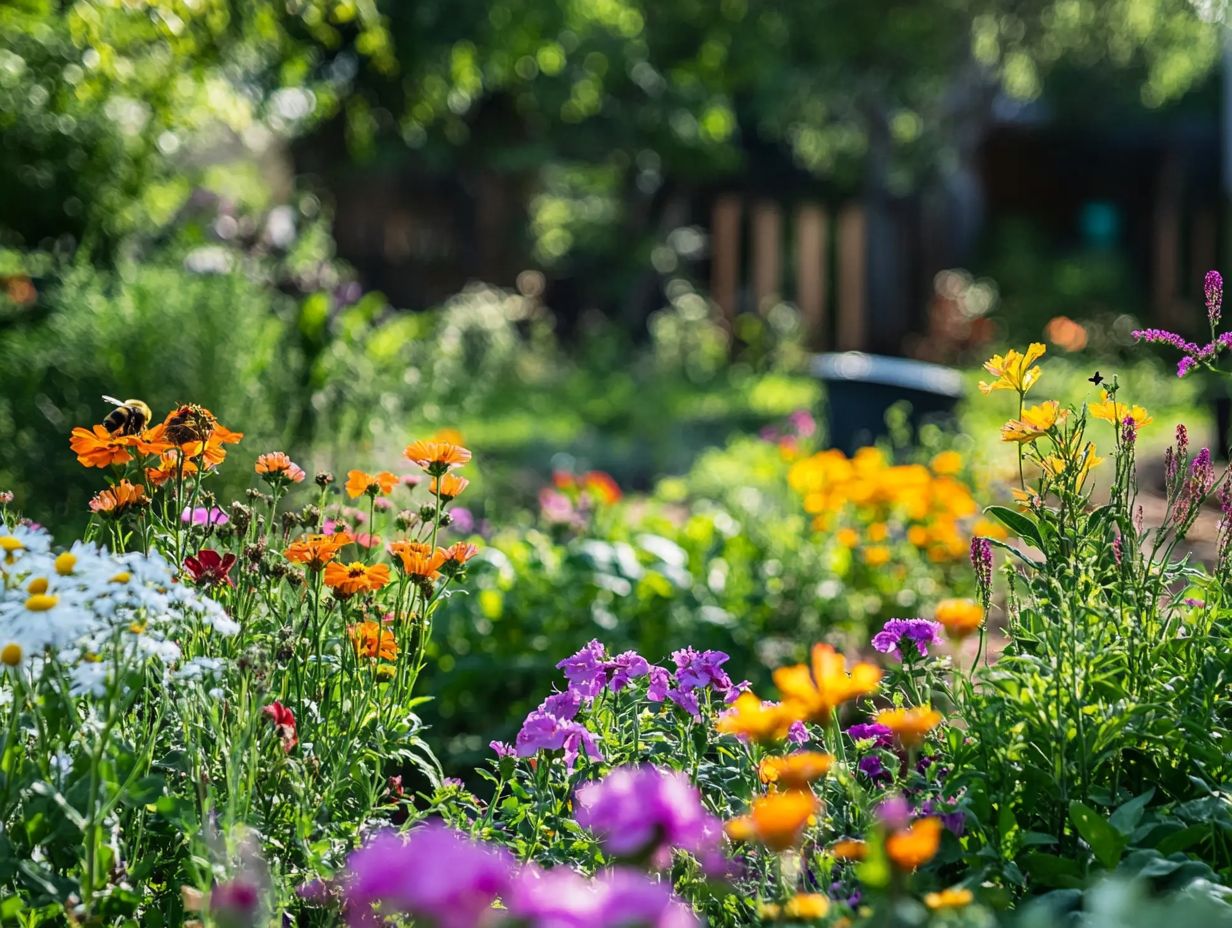
You can promote biodiversity by choosing a variety of plants, including native species, in your garden. Avoid using pesticides and allow some areas to grow wild, providing habitat for beneficial insects and animals.
What are some natural ways to control pests in my garden ecosystem?
Some natural ways to control pests include attracting predator insects by planting flowers and herbs such as marigolds, lavender, and dill. You can also use physical barriers, like mesh covers, to protect your plants from pests.
How can I improve the soil health in my garden ecosystem?
To improve soil health, add organic matter such as compost and mulch. This provides essential nutrients for plants and improves soil structure. Additionally, change the types of plants you grow each year to keep the soil healthy.
What are some sustainable practices I can incorporate into my garden ecosystem?
Some sustainable practices include using rain barrels to collect water, using compost instead of chemical fertilizers, and planting drought-resistant species. You can also reduce your carbon footprint by using hand tools instead of gas-powered ones.
How can I maintain a balanced ecosystem in my garden?
To keep your garden ecosystem healthy, avoid using harmful chemicals and pesticides. These can hurt helpful bugs and tiny organisms.
Check your garden regularly for pests and diseases. Use natural methods to handle any issues and provide a variety of plants to support diverse species.

